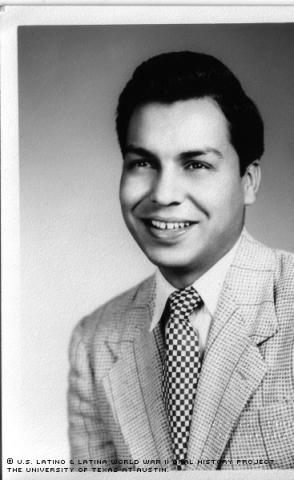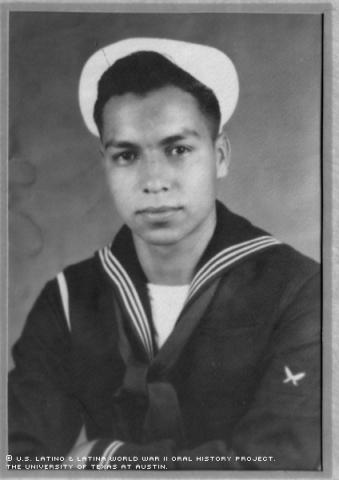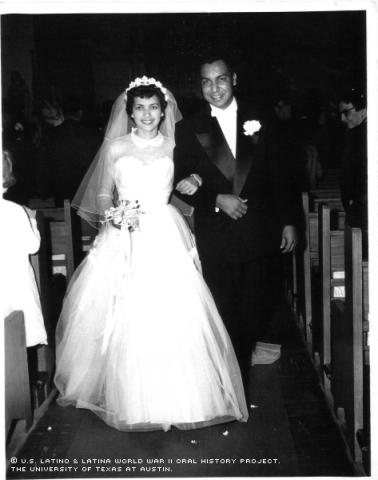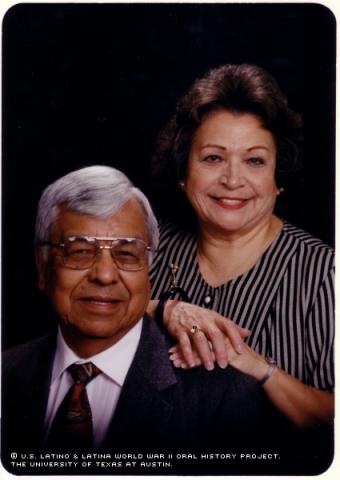



By Yvonne Lim
Growing up in the segregated town of Tempe, Ariz., during the late 1930s, Peter "Pete" Moraga recalls feeling nervous about public speaking.
Despite those early fears, Moraga, a World War II Navy veteran who served in the Pacific, fashioned a life as a journalist that consistently affirmed "La Voz Mexicana," or "the Mexican voice.” He worked with government radio program Voice of America, CBS Radio and, finally, at a Spanish-language television station.
Born June 10, 1926, Moraga was the third youngest of 11 children; three didn’t survive childbirth. His father, Carmen Moraga, was a truck driver who hauled flour from a local mill, while his mother, Carmen Noriega Moraga, tended to the home and family. Because the two had the same first name, people referred to them as the "Los Carmelitos." The family was poor, but Moraga says they always had enough to eat.
Although Moraga's mother and father didn’t complete school beyond the second grade, they expected their children to attend high school. He says his parents would often tell their children, "You don't want to be like us when you grow up."
Moraga didn't need much pushing. He graduated from high school in 1943 and immediately enrolled at the University of Arizona in Tucson. But after his freshman year, with World War II raging and older brothers Raymond and Reynaldo in the service, he enlisted in the Navy. Because he was 17, he had to get his parents’ permission.
Moraga was sworn in on D-Day, June 6, 1944, four days before his 18th birthday. But on his birthday, his brother, Raymond, was shot down over France while serving in the Army Air Corps. These anniversary dates became so painful for Moraga's mother that she ceased to celebrate Raymond and Pete's birthdays. Pete Moraga "learned to live with it." But when he was sent overseas, his mother made him pledge that if he returned home safely, he’d accompany her to a church for nine days of Masses, a promise fulfilled in 1946.
Moraga was assigned to Service Squadron 10, which supported a ship repair base on the Ulithi Atoll in the western Pacific Ocean. Despite his training as a yeoman, a Naval office clerk, Moraga was assigned to work the ship-to-ship radio.
"They needed enough people to control it [the radio] 24 hours a day,'' he said. "So they put me on it and I stayed there."
Discharged nine months after the war ended, Moraga’s radio work in the Navy would foreshadow greater glories over the airwaves.
"My naval stint was not one of action," he said. "There are no battle stories I can tell my kids."
However, his military experience was life changing in terms of breaking down racial barriers. Moraga explains he’d gone from an environment in Arizona where signs read, "No dogs or Mexicans allowed," to one of equality in the Navy. The term "Mexican" was often used in a derogatory manner, terms like "Latino" or "Hispanic" didn’t exist at that time, he says.
"Right after Pearl Harbor, all of a sudden, we were all Americans," Moraga said.
"Despite the fact that I could never hide the fact that I'm Mexicano, I felt equal,'' said Moraga, alluding to his dark complexion. "When I was in the Navy, I was treated equally. And that is one of the things we all got -- at least a taste of what equality felt like. We didn't have it in Tempe, but we did have it in the Navy."
Armed with this newfound self-confidence, Moraga returned to the University of Arizona. He completed his degree in advertising in 1949, the first member of his family to graduate from college.
Immediately after college, Moraga secured a position at a start-up station in Phoenix, KIFN, the state's first all- Spanish language radio station. On Nov. 23, 1949, programming started airing for KIFN, the slogan of which was, "KIFN: La Voz Mexicana." Moraga found there were few stories about Latinos carried on the wires or in the local news media, so he began to cover his own news pieces, sometimes acting on the request from the Hispanic community.
"I felt an obligation to be able [to] ... cover more about the Hispanic community than what was being covered at that time, because there were a lot of real good stories going on," Moraga said.
In 1957, after eight years at the station, Moraga switched to public relations work with the U.S. Information Agency. For 12 years, he worked for USIA's broadcast component, the Voice of America, a government short-wave news source that provides news to people around the world. His radio experience and bilingual ability brought several opportunities with the USIA, starting in Washington D.C., then in Mexico City; Kuala Lumpur, Malaysia; and, finally, Lima, Peru, as a press attaché.
"My job was to sell American foreign policy, the American way of life," Moraga said.
The Moraga family, which included wife Gloria Flores Moraga, whom he married on June 12, 1954, and five children, lived in Mexico City for six years.
"I thought it [Mexico City] was a place where I could do some good," Moraga said.
He resigned from the U.S.I.A in 1969, when he realized he couldn’t justify the Vietnam War to himself.
"One advertising professor said, 'it is very difficult to sell something you don't believe in," Moraga recalled. "A big part of what I was trying to sell in '67, '68, '69 was the Vietnam War. I couldn't believe that we should be there for the reasons we were saying we should be there."
Ultimately, the experience working as a public affairs officer helped define his mission as a journalist.
"It helped me realize what I wanted to do," Moraga said. "I wanted to be free from influence."
After returning to the United States in 1969, Moraga was hired as a reporter at KNX-CBS radio in Los Angeles. Plans to start his own public relations company with his son, Peter, were derailed after his youngest daughter, Catherine, was diagnosed with systemic Lupus and passed away in 1980.
A year later, Moraga continued his journalistic work as news director at KMEX-TV, and in 1987, he provided weekly commentary for the evening news on KCBS-TV.
"I think I gave a view of a Latino looking at the issues, which is what I wanted to do," Moraga said.
He returned to KNX a year later, before retiring in 1992. Moraga continues to stay active in the Hispanic community, most recently working with intergeneration outreach at the Mesa Senior Center.
Though he has received several awards and was inducted into the National Association of Hispanic Journalists Hall of Fame in 2001, he says the most important aspect was staying true to his ideals.
"I never felt that I had to sell myself or go against whatever I thought was the right thing to do," Moraga said.
Mr. Moraga was interviewed in Phoenix, Arizona, on January 4, 2003, by Maggie Rivas Rodriguez.

